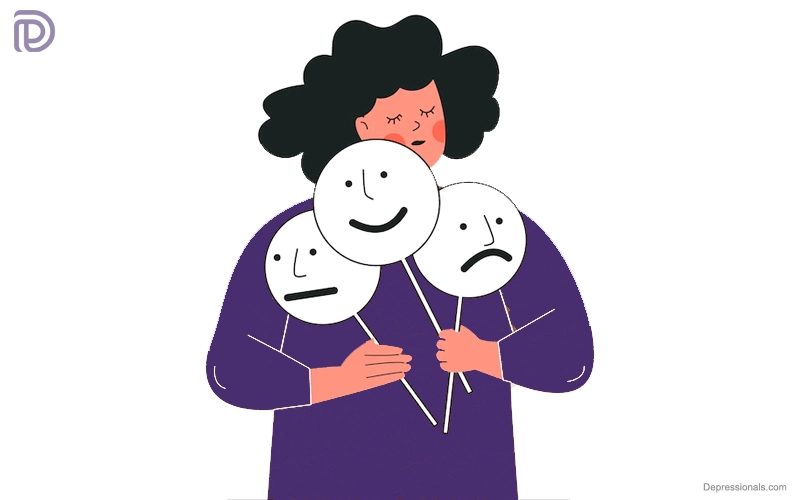Immature personality disorder (IPD) is an ICD-10 diagnosis defined as a lack of emotional growth and an inability to tolerate stress and anxiety. During the 21st century, there has been an increase in the prominence of the disorder. This disorder is classified as “F60.8 Other specific personality disorders”. According to a Danish study, more than 2.4% of all personality disorders are of these six “Other” types.
The term maturity refers to the point at which an animal, plant, or person reaches the end of its developmental process. People who haven’t reached that stage of development are immature. Physical development is easy to comprehend, but what does being emotionally immature mean?
A high level of emotional expression and control is considered emotional maturity by the American Psychological Association. Similarly, an immature personality can be defined as an “uncontrolled or inappropriate expression of emotions about the situation.”. In other words, inappropriate and out-of-control emotional behavior can be considered immature.
I would expect a child to react more emotionally than an adult.
Read: Emotional disorders
Signs of immature personality disorder
The social behavior of emotionally immature individuals does not meet the standards of society. Normally, a grown-up can consider the impact of their actions and pay attention to others’ feelings. Mature people are capable of accepting criticism and helping themselves to improve. The emotionally mature adult can also think ahead and create plans for the future. In contrast, individuals who are immature emotionally have trouble planning.
People with immature personalities tend to lack social and emotional skills, as well as have difficulty relating to other adults. You can tell that someone is emotionally immature if they exhibit the following behaviors:
Impulsive behavior: Children often exhibit this behavior. It is common for them to speak out of turn, for example. They don’t consider the effects their words may have on others. People eventually learn not to repeat such mistakes. The emotional immaturity of adults leads them to act on impulses rather than think before acting. Adults make unintentional or antisocial decisions.
Demanding attention: When people aren’t paying attention to young children, they become bored. It isn’t uncommon for them to act out negatively to draw attention back to themselves. People who lack emotional maturity often do the same. Even if they don’t act out negatively, they may try to get everyone’s attention by injecting themselves into discussions or by cracking inappropriate jokes.
Name-calling and bullying: Adults generally avoid schoolyard tactics in their interactions with others. Two adults rarely use names to insult each other. Behaviorally acting like a mean kid in school shows that the individual is not in control of their emotions. This shows that the individual is acting like a child.
Avoidance: People with emotional immaturity may not be able to plan for the future well. It is an indication of avoiding responsibility when you don’t take on significant roles in your life, such as marriage, career, or investment such as homeownership. Individuals like this are likely to let others take care of their needs too far beyond what they should be able to provide for themselves. Sometimes, this condition is referred to as Peter Pan syndrome, named after the fictional character who has no desire to grow up.
Narcissism: Understanding other people’s feelings and needs is one of the essentials of maturity. Immature people seem to only care about themselves. A person does not want to compromise or consider the opinions of others. He or she always wants to do things his or her way.
Read: Narcissistic Personality Disorder
Emotional immaturity
People with emotional immaturity are incapable of expressing or coping with serious emotions. An emotionally immature person will also have difficulty controlling their emotions or overreacting to situations.
Research indicates that emotional immaturity affects a person’s quality of life and their ability to develop and learn new skills.
What causes emotional immaturity?
Research on adult emotional immaturity does not reveal the cause. One factor that has been linked to immaturity in adults is mistreatment or abuse as a child.
Examples of emotional immaturity vs. Maturity
Emotional maturity differs greatly from emotional immaturity.
To demonstrate emotional maturity, one must be able to control their emotions and react appropriately to situations. All situations in which emotionally mature people interact with other people are handled in an adult-like manner.
Below are a few examples of emotional immaturity and mature behavior:
- Relationships: Emotionally mature People can calmly discuss the issue during a conflict in a relationship. Emotionally immature people will often become defensive about their part in the conflict, deny any wrongdoing, or avoid discussions about it.
- Professional situations: An emotionally mature person will take responsibility for issues at work and reflect on their part in them. Conversely, an immature person could lose their temper by shouting at their co-workers or be angry when praised for doing something right.
- Real-world situations: An emotionally mature person will practice patience when waiting in line, for example, or ask calmly how long it takes. Because they were waiting, an inexperienced person is likely to become frustrated or aggressive and might yell, curse, or walk away.
Managing an immature personality disorder and your mental health
Here are a few tips for managing relationships with emotionally immature people. It is possible to protect your mental health and reduce some stress when you work to resolve the situation.
Communicate: You can do this by being honest about their behavior but also being sensitive to their feelings. Then, ask them to be more sensitive in the future by noting how their words or actions affected you. This may require more than one discussion. It is not easy to change old emotional patterns.
Be positive: You should praise the person when they behave maturely and sincerely. Reinforcement is one of the most effective methods for promoting growth. Parents most often do this to encourage their children’s behavior. Praise is also beneficial for adults.
Adjust: You can also make minor adjustments to your expectations if they are reasonable. People may not change, but you can adapt your behavior. Find out what their patterns are, and use that information to change your behavior.
Read: How to Deal With a Narcissist
Emotional immaturity and BPD
Not all people who are emotionally immature have BPD, but they have difficulties regulating their emotions. Both emotionally immature people and people with BPD can act recklessly and impulsively, and both may exhibit dramatic mood swings.
There are more characteristics of BPD than immaturity of emotions. People with BPD often experience intense emotional reactions that are felt deeply, and they are not manipulating others or attempting to get a reaction from them. It is often difficult for them to identify what emotions they are experiencing since they see everything as black or white. Illnesses rather than refusal to grow up cause their unpredictable and sometimes unreasonable behavior.
Narcissism and emotional immaturity
Immaturity and narcissism are often confused. There is a possibility of mistaking emotional immaturity for borderline personality disorder. Borderline personality disorder, narcissism, and emotional immaturity can all be confused with dissociative identity disorder. An individual with narcissism has a personality disorder. The exaggerated sense of self and entitlement exhibited by narcissists is a well-known characteristic. No matter what qualifications they lack, they insist on being recognized as superiors.
There are five characteristics of childish behavior in adult psychology and examples of immature behavior that are used in diagnosing narcissistic personality disorder:
- Overinflated self-esteem
- It is constantly thinking that you are better than others at anything, whether it’s being successful, powerful, smart, loved, or attractive
- Desire to associate only with high-status people due to feelings of superiority
- Overabundance of admiration
- Sense of entitlement
- Utilization of others to achieve goals
- Lack of empathy and consideration for others’ feelings
- A snobbish or arrogant attitude
When your behavior gets out of control and you wish to undergo therapy to help yourself, mental health professionals can perform an immature personality disorder test, an emotional immaturity test, or an emotionally mature test and assessment.
Consult a Professional
A relationship with someone who is suffering from immature personality disorder may never be smoothed out on your own. Consider finding someone who can assist you if that’s the case. You and your partner can improve your relationship with the help of a family counselor or couple’s therapist.
Discuss the situation with a human resources representative if the emotionally immature person is your coworker. There might be ways to collaborate more constructively with them.
Individuals can change and grow. It may be possible to help someone you care about learn how to act more like an adult if they are emotionally immature. You can speak to a counselor for advice on how to deal with an emotionally inexperienced person if they refuse to change.






The article is good. Thank you so much.
Good article. Thanks, heaps for this!… if anyone else has this it would be much appreciated.
nice post. There is also some different causes of immaturity due to parenting issues.
These kind of post are always inspiring and I prefer to check out quality content so I happy to finally find many excellent point here in the post, writing is simply great, thank you for the post
These kind of post are always inspiring and I prefer to check out quality content so I happy to finally find many excellent point here in the post, writing is simply great, thank you for the post
Thanks for another informative blog. Where else could I get that kind of info written in such an ideal way? I’ve a project that I’m just now working on, and I have been on the look out for such info.
Excellent writeup. Very insightful.
This is very informative.
An interesting discussion is price comment. I believe that you should write more on this topic, it may not be a taboo topic but typically persons are not enough to speak on such topics. To the next. Cheers